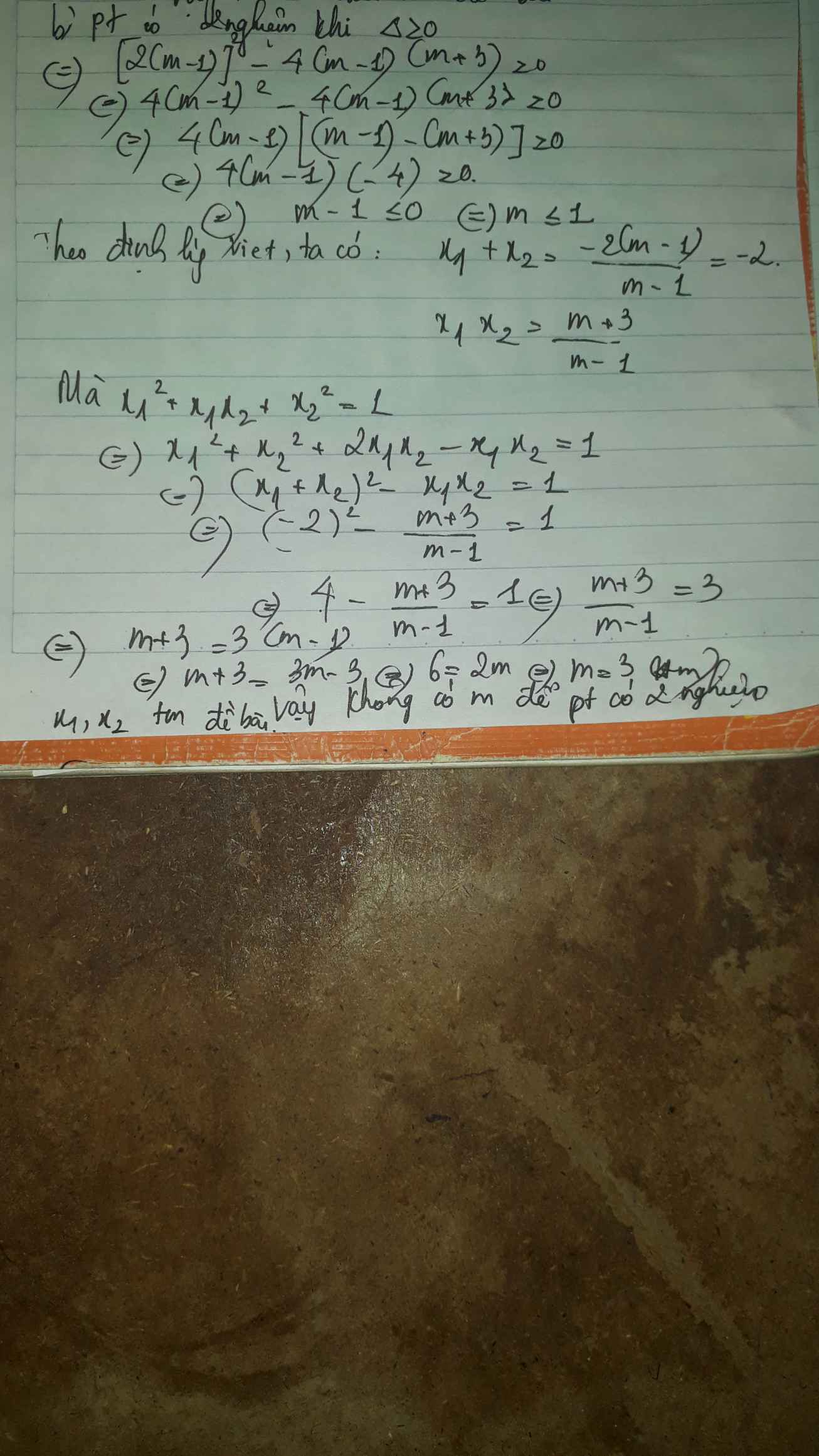Hãy nhập câu hỏi của bạn vào đây, nếu là tài khoản VIP, bạn sẽ được ưu tiên trả lời.

\(\text{Δ}=\left(-8\right)^2-4\cdot\left(-3\right)\cdot\left(m-1\right)\)
\(=64+12\left(m-1\right)\)
=64+12m-12
=12m+52
a: Để phương trình có hai nghiệm phân biệt nhỏ hơn 7 thì
\(\left\{{}\begin{matrix}12m+52>0\\8< 14\end{matrix}\right.\Leftrightarrow m>-\dfrac{13}{4}\)
b: Để phương trình có hai nghiệm phân biệt lớn hơn 7 thì \(\left\{{}\begin{matrix}12m+52>0\\8>14\end{matrix}\right.\Leftrightarrow m\in\varnothing\)

- \(\Delta^'=m^2-\left(m-1\right)\left(m+1\right)=m^2-m^2+1=1>0\)vậy phương trình luôn có hai nghiệm với mọi \(m\ne1\)
- Theo viet ta có : \(\hept{\begin{cases}x_1+x_2=2m\\x_1x_2=m+1\end{cases}}\)\(\Rightarrow m+1=5\Rightarrow m=4\Rightarrow x_1+x_2=2m=2.4=8\)
- từ hệ thức viet ta khử m được hệ thức liên hệ giữa 2 nghiệm ko phụ thuộc m: thấy \(x_1+x_2-2x_2x_1=2m-2\left(m+1\right)=-2\)
- \(\frac{x_1}{x_2}+\frac{x_2}{x_1}=-\frac{5}{2}\Leftrightarrow\frac{x_1^2+x_2^2}{x_1x_2}=-\frac{5}{2}\Leftrightarrow\frac{\left(x_1+x_2\right)^2-2x_1x_2}{x_1x_2}=-\frac{5}{2}\)\(\Leftrightarrow\frac{4m^2-2m-2}{m+1}=-\frac{5}{2}\Rightarrow8m^2-4m-4=-5m-5\left(m\ne-1\right)\)\(\Leftrightarrow8m^2+m+1=0\left(vn\right)\)không có giá trị nào của m thỏa mãn

d: Ta có: \(\text{Δ}=\left(m+1\right)^2-4\cdot2\cdot\left(m+3\right)\)
\(=m^2+2m+1-8m-24\)
\(=m^2-6m-23\)
\(=m^2-6m+9-32\)
\(=\left(m-3\right)^2-32\)
Để phương trình có hai nghiệm phân biệt thì \(\left(m-3\right)^2>32\)
\(\Leftrightarrow\left[{}\begin{matrix}m-3>4\sqrt{2}\\m-3< -4\sqrt{2}\end{matrix}\right.\Leftrightarrow\left[{}\begin{matrix}m>4\sqrt{2}+3\\m< -4\sqrt{2}+3\end{matrix}\right.\)
Áp dụng hệ thức Vi-et, ta được:
\(\left\{{}\begin{matrix}x_1+x_2=\dfrac{m+1}{2}\\x_1x_2=\dfrac{m+3}{2}\end{matrix}\right.\)
Ta có: \(\left\{{}\begin{matrix}x_1+x_2=\dfrac{m+1}{2}\\x_1-x_2=1\end{matrix}\right.\Leftrightarrow\left\{{}\begin{matrix}2x_1=\dfrac{m+3}{2}\\x_2=x_1-1\end{matrix}\right.\)
\(\Leftrightarrow\left\{{}\begin{matrix}x_1=\dfrac{m+3}{4}\\x_2=\dfrac{m+3}{4}-\dfrac{4}{4}=\dfrac{m-1}{4}\end{matrix}\right.\)
Ta có: \(x_1x_2=\dfrac{m+3}{2}\)
\(\Leftrightarrow\dfrac{\left(m+3\right)\left(m-1\right)}{16}=\dfrac{m+3}{2}\)
\(\Leftrightarrow\left(m+3\right)\left(m-1\right)=8\left(m+3\right)\)
\(\Leftrightarrow\left(m+3\right)\left(m-9\right)=0\)
\(\Leftrightarrow\left[{}\begin{matrix}m=-3\\m=9\end{matrix}\right.\)

b) phương trình có 2 nghiệm \(\Leftrightarrow\Delta'\ge0\)
\(\Leftrightarrow\left(m-1\right)^2-\left(m-1\right)\left(m+3\right)\ge0\)
\(\Leftrightarrow m^2-2m+1-m^2-3m+m+3\ge0\)
\(\Leftrightarrow-4m+4\ge0\)
\(\Leftrightarrow m\le1\)
Ta có: \(x_1^2+x_1x_2+x_2^2=1\)
\(\Leftrightarrow\left(x_1+x_2\right)^2-2x_1x_2=1\)
Theo viet: \(\left\{{}\begin{matrix}x_1+x_2=-\dfrac{b}{a}=2\left(m-1\right)\\x_1x_2=\dfrac{c}{a}=m+3\end{matrix}\right.\)
\(\Leftrightarrow\left[-2\left(m-1\right)^2\right]-2\left(m+3\right)=1\)
\(\Leftrightarrow4m^2-8m+4-2m-6-1=0\)
\(\Leftrightarrow4m^2-10m-3=0\)
\(\Leftrightarrow\left[{}\begin{matrix}m_1=\dfrac{5+\sqrt{37}}{4}\left(ktm\right)\\m_2=\dfrac{5-\sqrt{37}}{4}\left(tm\right)\end{matrix}\right.\Rightarrow m=\dfrac{5-\sqrt{37}}{4}\)

\(\Delta'=\left(m+1\right)^2-\left(2m-3\right)=m^2+4>0,\forall m\inℝ\)
nên phương trình luôn có hai nghiệm phân biệt \(x_1+x_2\).
Theo định lí Viete:
\(\hept{\begin{cases}x_1+x_2=2m+2\\x_1x_2=2m-3\end{cases}}\)
\(P=\left|\frac{x_1+x_2}{x_1-x_2}\right|=\frac{\left|x_1+x_2\right|}{\left|x_1-x_2\right|}=\frac{\left|x_1+x_2\right|}{\sqrt{\left(x_1+x_2\right)^2-4x_1x_2}}\)
\(=\frac{\left|2m+2\right|}{\sqrt{\left(2m+2\right)^2-4\left(2m-3\right)}}=\frac{\left|2m+2\right|}{\sqrt{4m^2+16}}=\frac{\left|m+1\right|}{\sqrt{m^2+4}}\ge0\)
Dấu \(=\)xảy ra khi \(m=-1\).

a: \(\text{Δ}=\left(-4\right)^2-4\cdot2\cdot5\left(m-1\right)\)
\(=16-40\left(m-1\right)\)
\(=16-40m+40\)
=-40m+56
Để phương trình có hai nghiệm phân biệt nhỏ hơn 3 thì
\(\left\{{}\begin{matrix}-40m+56>0\\\dfrac{4}{2}< 6\end{matrix}\right.\Leftrightarrow-40m>-56\)
hay m<7/5
b: Để phương trình có hai nghiệm phân biệt lớn hơn 3 thì
\(\left\{{}\begin{matrix}-40m+56>0\\\dfrac{4}{2}>6\end{matrix}\right.\Leftrightarrow m\in\varnothing\)